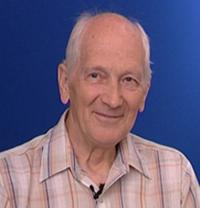At school even a scrubwoman had to be an atheist

Download image
Vladimír Roháček was born in 1940 in the village of Beniakovce in eastern Slovakia. After the communist takeover, his family experienced one affliction after another. At first, the regime harshly affected the life of Vladimír’s grandfather, Ondrej Halás, who was a ”local kulak”. Even though he joined the agricultural cooperative, he didn’t manage to avoid being imprisoned. After a year in an agricultural cooperative, he was wrongfully accused of delivering insufficient quotas, while in fact they only had to carry out the plan on number of convicted kulaks. Ondrej Halás was chosen to be a victim. He was sentenced to three years of imprisonment and a financial penalty of hundred thousand crowns. If he hadn’t paid it, he would have spent another year in jail. His family was deprived of the whole property and their relatives were driven to Czech part of the republic, where they had to work on the state property. After serving his sentence, the family returned to their native village of Beniakovce, where they started to build a new life. Another persecuted person in the family was Vladimír’s father, a teacher Emanuel Roháček, who was in a centre of the State Security’s attention for his activities such as writing letters of complaints, defending his father in law, Ondrej Halás, protesting against injustice in judiciary as well as for his religious belief. After he was dismissed from school for his “idealistic worldview”, he kept small crosses made of white marble, which were initially meant to be hung in classrooms, and his colleague snitched it to the State Security. He was confined to psychiatry, where they tried to liquidate him. Fortunately, they were not successful. The third was Vladimír himself, who was studying in Košice at the beginning of the year 1959 and taking part in Baptist meetings of youth. The State Security was really afraid of the similar youth gatherings and thus the members of religious groups were usually called “subversives of the republic”. Vladimír along with his friend Miloš Rataj were found guilty in a fabricated lawsuit of alleged establishment of the sect called Modrý kríž (Blue Cross). Modrý kríž actually was an association of Evangelic abstainers founded in the early 20th century. The fact that they founded the sect was sensation in all newspapers. He was given three years, so he appealed to the Supreme Court, which later acknowledged that he hadn’t founded the “sect”, but shortened his sentence only by a year as he “needed re-education” for supporting the religious activities. He went through the remand centres in Košice and in Pankrác and then he served his two-year sentence in Lipkovice camp near Litvínov. After coming back home, he was employed as a technical education teacher; however, in the period of the so-called normalisation, he was dismissed again for his religious belief. Subsequently, he found a new job and even though it was worse paid and more physically demanding, he had a clear conscience that he didn’t give up his belief. After 1989 the administrative changes made him professionally disadvantaged and unemployed for some time, but he considered the fall of the regime to be necessary for opening the door into a free world, mainly for his children.
